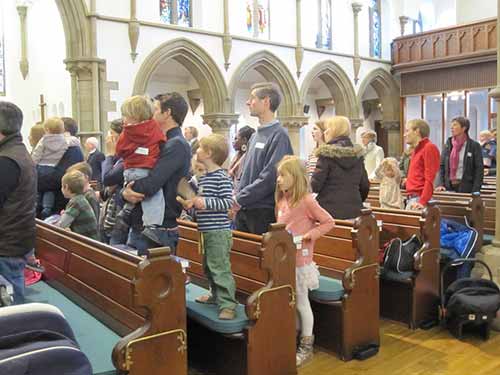
The English word ‘church’ comes from the Greek word κυριακός (kuriakos) meaning “of the Lord”. κυριακός is used only twice in the New Testament – neither of them in the way we would use ‘church’, and in neither case would we translate it as ‘church’. In 1 Corinthians 11:20 there is mention of a Supper not “of the Lord”. In Revelation 1:10 it is the day “of the Lord”. And the word κυριακός isn’t about THE Lord – it is any lord.
We have no evidence that Jesus ever used κυριακός. It is not found in the Gospels.
The English word “church”, however, is used many times in most English translations. It mostly translates ἐκκλησία (ekklesia). ἐκκλησία derives from ἐκ (ek) and καλέω (kaléō) – to call out; to call forth. Like κυριακός, ἐκκλησία is not a Christian word, a Jewish word, or even a particular religious or spiritual word. In Greek it often referred to an assembly of citizens, a town meeting.
Meanwhile, some were shouting one thing, some another; for the assembly (ἡ ἐκκλησία) was in confusion, and most of them did not know why they had come together… If there is anything further you want to know, it must be settled in the regular assembly (ἐκκλησία). For we are in danger of being charged with rioting today, since there is no cause that we can give to justify this commotion.’ When he had said this, he dismissed the assembly (ἐκκλησία).Acts 19:32, 39-41
Luke uses ἐκκλησία for the rioting mob called out from Ephesus, and for those assembled with Moses at Sinai (Acts 7:38), and for the followers of Jesus in Acts 5:11.
In the Gospels, ἐκκλησία occurs only twice – both in Matthew (Matthew 16:18; 18:15-17).
Ekklesia continues in Latin and all the romance languages. It does not continue in English, German, or any Teutonic or Slavonic languages.
So, in summary: Whilst, for the word ‘church’, other languages continue to use the non-churchy Greek word that the New Testament uses for church (a word probably never used by Jesus), the English word ‘church’ comes from a non-churchy Greek word never used for church in the New Testament.
Someone else may have an idea why this is the case – and even what results from this…
If you appreciated this post, do remember to like the liturgy facebook page, use the RSS feed, and sign up for a not-very-often email, …



